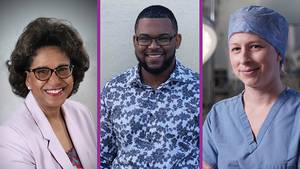Contributed
For more than 40 years, George Holmans experienced heart rhythm problems. His life had become a series of increasingly more frequent heart rhythm irregularities that left him feeling completely exhausted, and often requiring emergency care.
“Each time I would have an attack, it felt like I was carrying 100 pounds of flour on my shoulders,” describes George. “If I didn’t end up in emergency, I would need to rest for hours – sometimes days. I had an increased risk for developing a blood clot or having a stroke so it was time to find a fix for me.”
In 2015, he had surgery at the QEII to correct his abnormally low heart rate.
Every two years, 110,000 patients like George require life-saving heart health care at the QEII. And that number continues to grow.
“The prevalence of cardiovascular disease is rising in the region due to an aging population and risk factors such as high blood pressure, cholesterol, obesity, lack of physical activity, and diabetes,” says Dr. Camille Hancock Friesen, QEII cardiac surgeon.
The heart is one of the most important organs in the entire human body. It beats approximately 72 times per minute and enables our body to function. That’s 103,680 beats a day, 725,760 beats a week, allowing us to work, play, and live.
To help keep those hearts beating, the QEII Foundation and the Maritime Heart Centre have joined forces to transform heart health care starting with the
“From the time of diagnosis, to surgery, and the outpatient experience, through to research and prevention – our vision will transform heart health at the QEII for the patients who need it most,” says Dr. Hancock Friesen. “We are designing patient-centric care that will be unprecedented in our system. The first two areas the
The QEII is the only centre in Nova Scotia that provides a high-level of cardiac imaging and intervention. The
Approximately 5,400 patients a year, including those from New Brunswick and Prince Edward Island, have a procedure in a QEII cath lab. This includes patients with genetic heart conditions, disease, or other complications who visit the lab to determine their condition and care plan.
During catheterization, the physician guides a small tube-like device, called a catheter, through a patient’s arteries until it reaches the coronary arteries. Once the catheter is in place, the physician can inject dye and take images to assess the structure and function of the heart.
If a blockage is found, the care team is often able to open up the blockage in the cath lab. These life-saving surgical procedures only become apparent once the catheter is in place and a true image of the heart is seen. High-level digital imaging is required to do this and this is why there is an immediate need to transform one of the cardiac cath labs. Patients born with heart defects are also more often able to be treated in an interventional cath lab as heart valves and plugs that close inherited holes in the heart can be deployed through patients blood vessels.
Constructed in 2003, the 13-year-old lab is now only able to be used as a diagnostic lab meaning no interventional procedures can take place due to its poor imaging quality.
Another focus of the
“The Innovation Fund will help QEII physicians and researchers with the some of the resources they need to advance treatment and improve care,” says Dr. Hancock Friesen. “This means better outcomes for patients and families.”
The Innovation Fund will be a catalyst for attracting and leveraging further investment from community champions and global investors. As this is a fund that continues to grow, its impact to the future of heart health will be transformational.
The campaign is welcome news to George, as the QEII is near and dear to his heart.
“My surgery gave me back my quality of life,” says George, who is enjoying his retirement with his wife, Sharon. “I now get to spend my days strolling through the Public Gardens with Sharon and planning our next travelling adventure. Life is good.”
To learn how you can give from the heart, for heart health at the QEII, visit QE2Foundation.ca/current/heart or call 902 334 1546.








